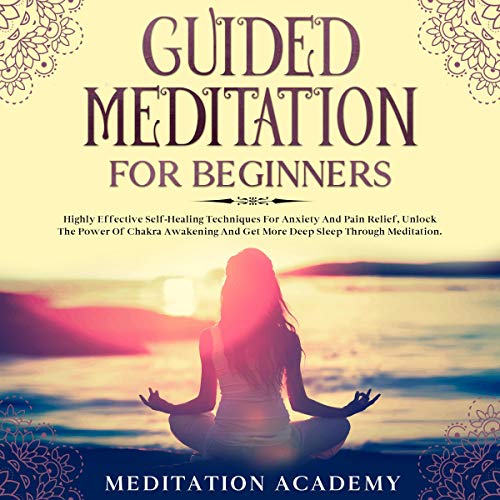
Meditation is a mental exercise that keeps the practitioner present in the present moment. It has been practiced for many purposes over the years, including mental balance and emotional well-being. It can be used in a variety of medical conditions as part of a holistic therapy program. This article will examine a wide range of meditation styles and give a clearer understanding of the ancient art. But first, we should clarify what it is not.
Guigo II, a Western Christian monk, described four steps to meditation. These steps are to think, meditate, read and pray. In the 16th century, saints Ignatius Loyola (or Teresa of Avila) further developed these practices. While meditation was long practiced in Eastern cultures, Western meditation is now more common in Western culture. There are many ways to practice meditation, so it is important to have a clear understanding of the practice.

The benefits of meditation must be included in a meditation definition. Meditation should aim to improve awareness. While meditation is a mental exercise, it should not be mistaken for a lifestyle change. It is not a way to instantly transform your life. It should become a daily habit that transforms your thoughts and behaviors. However, if you keep practicing it, it can help to raise your awareness and lead to higher levels of enlightenment.
Meditation offers many benefits. This practice isn’t only for those who want to feel good. Meditation can help you improve the quality and quantity of your life. Meditation can improve your mood and anxiety and help to achieve your goals. It can even alter the chemical levels in your brain which can make it more positive and productive. You may find it helpful to meditate every day if you experience anxiety symptoms.
Another important benefit of meditation is that it can reduce stress and help you achieve inner peace. Meditation does more than calm your mind. It can help you relax and lower stress levels. By practicing meditation, you can be happier and healthier. If you are busy, you will want to spend more time doing the things that you love. This is not necessarily a bad thing. To be happy, you must take some time for yourself.

Meditation can help to achieve inner peace. Meditation can not only help you find inner peace, but it can also increase your self-awareness. There are many forms of meditation. Each type has its advantages. While some people find meditation helpful in their daily lives, others find it distracting. Meditation can be a great way to gain clarity and perspective. It can also help you become more productive. Meditation daily is a good way to be more relaxed.
FAQ
Are mental health and work more important than mental health?
Everybody needs to be healthy, especially when they are working. It is important to take time to relax, whether you're at work or with friends.
You should speak to your boss if you are struggling with relaxation. They may be able to suggest ways to relieve your stress.
You should also take care of your physical well-being as well. Eat well, exercise and get enough sleep are all important.
What does a psychologist say about mental health?
Psychologists believe mental health is an important part of human growth. Psychologists also believe that mental wellness is not just about having mental illness free of all causes, but about being mentally healthy.
Mental health is a topic that psychologists have differing opinions on. Some psychologists argue that mental well-being is not important, as there are many people without mental illnesses. Others feel that mental well-being is vital because it allows us to function properly.
What effect does mental health have on my relationships?
Your mental health has an impact on every area of your life. It can impact your ability to function well at home, school and work. It can also be difficult to develop meaningful relationships when you have mental health problems.
A mental health condition can make it easy to isolate oneself from others. You might even avoid social situations if you feel like no-one understands.
But it is important to remember that people will want to be around your. They just need to learn how to approach and approach you.
If you have trouble connecting with people, it is worth talking to them about what your feelings are. Tell them how you're feeling and ask them for their advice.
What can I do about mental health issues?
It's not always easy to prevent mental illness. Here are some points to keep your mind clear:
-
Don't drink alcohol. You can have a negative effect on your mood and increase your chance of getting depressed.
-
Avoid using drugs. Drugs can cause brain damage and worsen your symptoms.
-
Get enough sleep. Depriving yourself of sleep can lead to anxiety and depression.
-
Exercise regularly. Exercise releases endorphins in your body, which makes you happy.
-
Make sure you eat healthy foods. Do not eat junk food. You will feel lethargic and depressed.
-
Spend time with your loved ones. Spending time with people you love can make you feel happier.
-
Have fun. Have fun with your life.
-
It is important to take breaks from social networking. Social media sites can make people feel lonely and isolated.
-
Be kind to your self. Treat yourself nicely, even if you aren't feeling great.
-
Ask for help. If you're having trouble coping, then ask for help. Talking to your family member or friend can be very helpful.
-
Remember, it's OK to cry. Crying helps you release tension and stress. It doesn't mean anything bad happened.
-
Be busy. Try to find something you like.
-
You should practice good hygiene. A lack of hygiene can make you look unattractive and unclean.
-
Stay connected. Stay positive by connecting to others.
-
Learn how relax. Relaxation techniques like yoga and meditation can help you cope better with stress.
-
Find meaning in what your do. Find meaning in your hobby or work can bring you fulfillment.
-
You should be focusing on the moment. You won't worry about the future if you are focusing on the moment.
-
Set goals. Setting goals can motivate you to achieve them.
-
Do something kind for yourself. You can improve your self-esteem by doing something nice for you.
-
Practice gratitude. Gratitude can help to appreciate all the blessings in your life.
-
Volunteer. Volunteering can provide a rewarding way to spend time with friends and make an impact on the world.
-
Give back. Giving back to others can make it feel fulfilling.
-
Be alert for warning signs. If you notice any changes in behavior, don't hesitate contacting help.
What is the impact of mental health on our daily lives?
Everyone is affected by mental illness at one time or another. The difference between individuals with mental illness or others is the fact they don’t seek treatment. Talk to someone when you feel that something isn't right. There are many ways to deal with depression, anxiety, stress, etc., such as therapy, medication, exercise, diet, meditation, and other methods.
Statistics
- In any given year, an estimated 18.1% (43.6 million) of U.S. adults ages 18 years or older suffered from any mental illness, and 4.2% (9.8 million) (healthypeople.gov)
- More than 50% will be diagnosed with a mental illness or disorder at some point in their lifetime.3 (cdc.gov)
- It does have some influence, but not nearly as much as we might think, so focusing less on attaining wealth will likely make you happier (Aknin, Norton, & Dunn, 2009); (positivepsychology.com)
- Neuropsychiatric diseases are the leading cause of death and disability in the U.S., accounting for 18.7 percent of all years of potential lifespan loss and premature mortality.
- According to the National Alliance of Mental Illness (NAMI), one in five Americans experiences mental health issues which translates to more than 40 million adults a year. (doctorondemand.com)
External Links
How To
How to Determine if a Mental Health Expert is needed
These signs will help you determine if you should seek professional help. You should consult a doctor immediately if you see any of these warning signs.
-
You feel lost in your own head.
-
You are having difficulty sleeping.
-
When you try to focus, your thoughts race.
-
You are thinking about suicide.
-
You feel hopeless.
-
You feel like life isn't worth living.
-
You are not interested in the same things that you used to love.
-
You have stopped eating.
-
You have been removed.
-
You've tried using alcohol or drugs to deal with stress.
-
You're starting to lose close friends and family members.
-
Other symptoms may include stomachaches, backaches or headaches.
These signs are important indicators that you need to seek medical attention immediately.